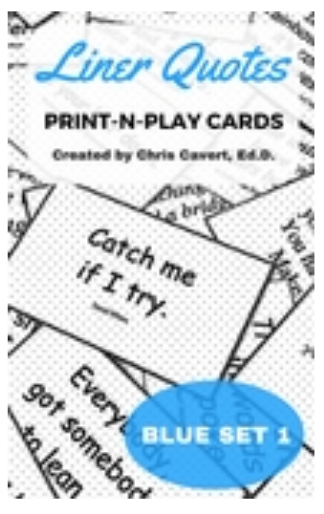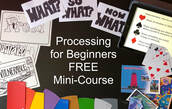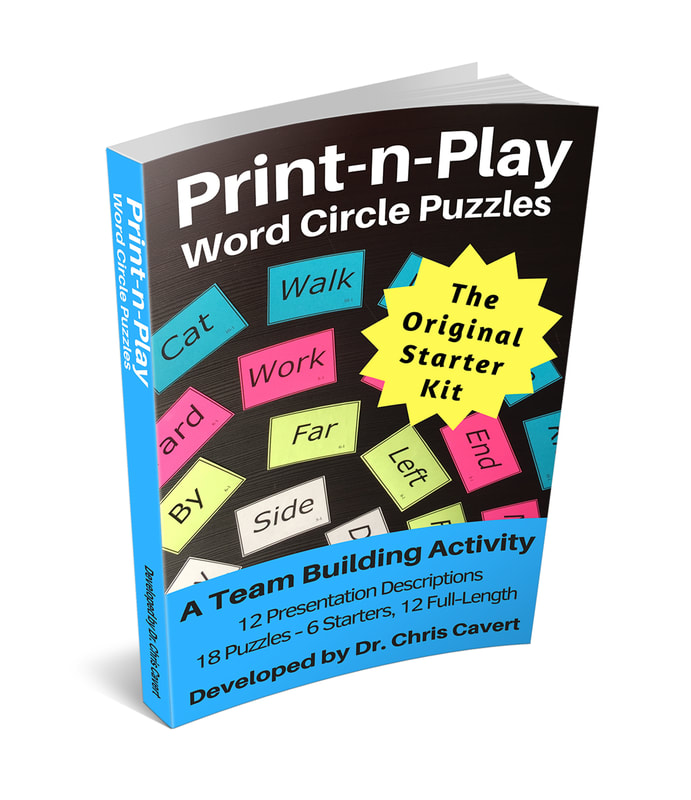This one can also be done (I'm imagining - since I haven't tried it yet) with any deck of image cards (e.g., Chiji Cards or Climer Cards). I've included the Frontloading for image cards after the ZOOM Book pages version.
I wanted a fairly quick activity to present to an adult group of 25 that could help me observe their initial behaviors around leadership and how the group communicated with each other - who was doing the talking and who wasn't. Another program objective (from the group) was to address how they handled change. Something the group members would be experience throughout their jobs. The long story short, we tried Image Changing.
Programming Note: Right now, I'm thinking this one, for the complexity desired, will work with 20 to 30 participants (there are 30 good usable pages in the ZOOM Book). I also believe we can go as young as 5th graders - I think they could do it if there are a few leaders in the group.
Directions Using ZOOM Book Pages
- Prepare a sequence of ZOOM Book pages equal to the number of people in the group - each person will need a ZOOM Book page.
- Shuffle up the pages. TIP: Wait until the last minute with your group to be sure you have the correct number of pages before you shuffle them up.
- Deal out one page to each person with the image side down. Ask everyone not to look at the image on the page s/he is holding until instructed to do so.
- Tell your group this activity will be played out in a number of different rounds. There will be quiet-shuffling rounds and talk-solving rounds.
- The Objective: Solve the challenge within the time limit of a talk-solving round.
- Tell the group: "The pages you have in your hands go into a particular sequential order. Your challenge is to put these pages into that order with each person in the group holding on to one page."
- During a talk-solving round, participants can only look at the images on the pages of everyone else in the group - they may not look at the image on their own page.
- Start out with a quiet-shuffle round. No one is allowed to speak during the quiet-shuffle round.
- Ask everyone to move among the group and exchange their image page with five different people - still, no one looking at any of the image sides. After exchanging with five different people a person is required to stop moving.
- It is okay to exchange more than five times. However, a person should stop moving after s/he has exchanged five times.
- When everyone has stopped moving (they should not be in a circle if they followed the directions), the group will move into a talk-solving round.
- When you say, "GO!" (you start your timer), the pages can then be held up so others can see the image sides. (Remember, a person may not look at her/his page image.)
- A challenging talk-solving round is 60-seconds long. However, you can go longer (e.g., 90-seconds) if you believe it will benefit the group. (I'm thinking maybe younger groups get a bit more time.)
- When the talk-solving round time is up, call, "Pages down." This means participants are required to again hold their pages with the image facing down towards the ground/floor.
- At this time, you can call, "Quietly exchange your page with five different people and then stop moving."
- When moving stops, you can go right to, "GO!" to start another talk-solving round.
- This rotation between quiet-shuffling and talk-solving rounds continues until the challenge is solved.
- When someone in the group states something like, "We got it!" during a talk-solving round, stop the time and check their result. If they got it, game over. Process the experience.
- If they don't have it, start the time back up and say, "Not yet." Have them continue their work.
Preparation: When I end up trying Image Changing with image cards, I will pick out the images that are a bit easier to name versus the more esoteric cards - I think you'll know what I mean when you look at the image cards you have. A logical sequence will be alphabetical by the name of the image - if they choose this sequence. Have enough cards so each person in the group receives one.
Frontload
- "The cards in your hands can be arranged in a logical sequential order - there will be a beginning and an end to the order. Your challenge is to find and then circle up in that order during a talk-solving round."
NOTE: This Frontload leaves it open for some creative sequencing. As noted above, alphabetical order is one possible sequence - which might be tricky with all the changing going on. What other possible sequences are there for the group to discover?
All the remaining directions above stay the same (I imagine?!).
- It is ever-changing. What were the reactions to these changes?
- How is time spent? Taking time to help everyone understand what is going on (being on the same page) versus always trying to be 'solving' is a great skill to practice. (Taking a breath.)
- Leadership must emerge, as well as followership. Too many leaders might slow success.
- Listening is vital to understand ones 'place' in the solution.
- Helping and the willingness to accept help is necessary.
- Sharing detailed information IS NOT always necessary. It might slow you down when you need to go fast.
All the best,
Chris Cavert, Ed.D.







 RSS Feed
RSS Feed